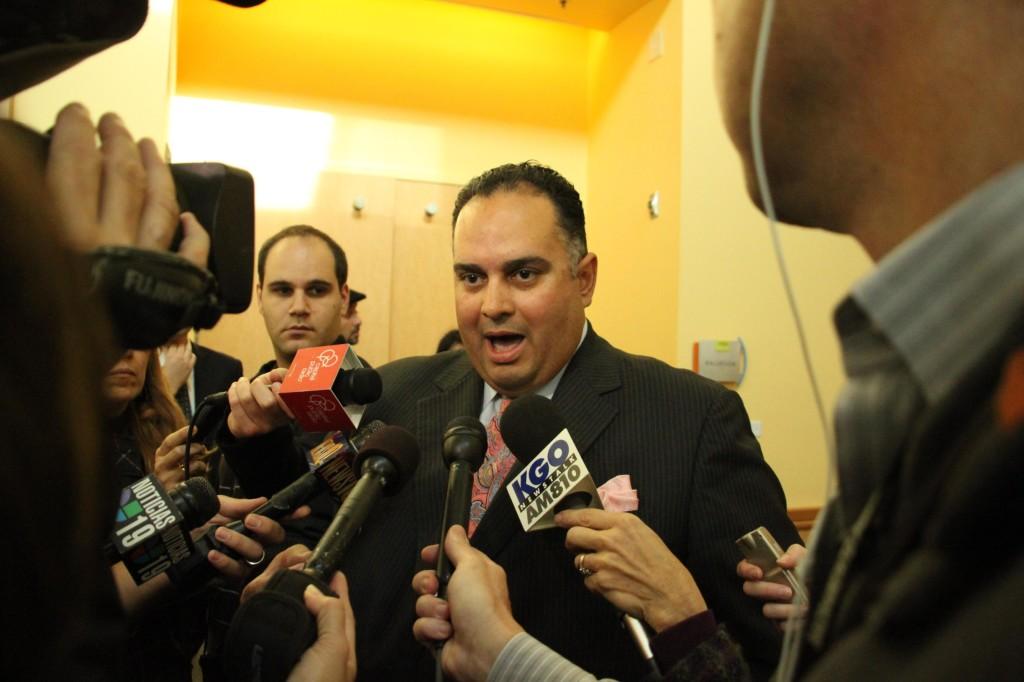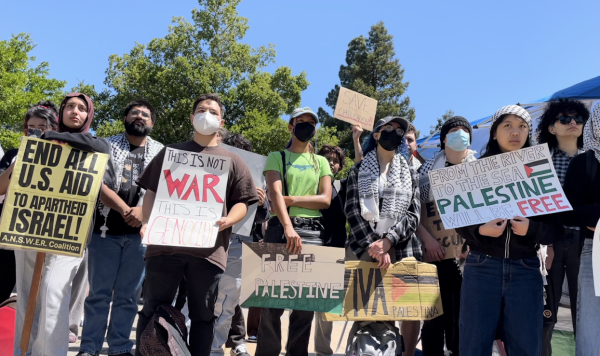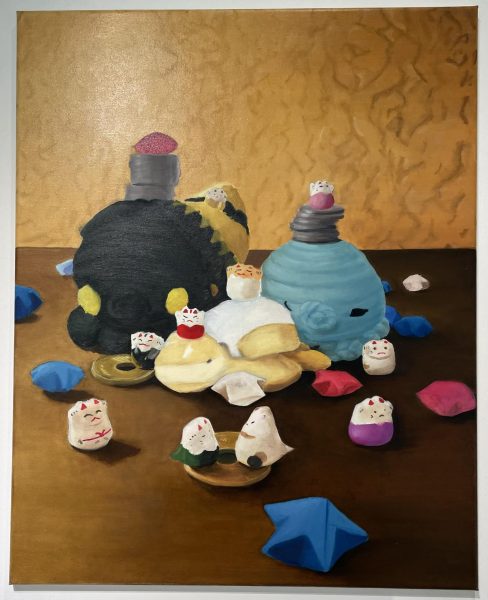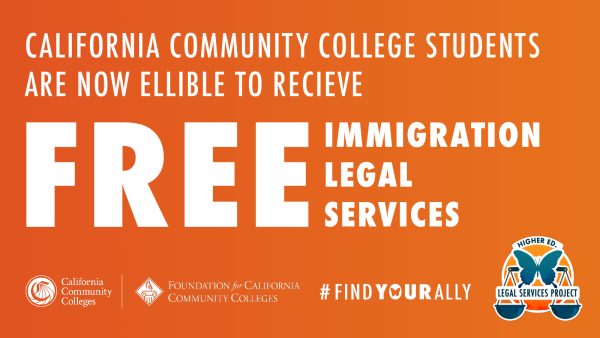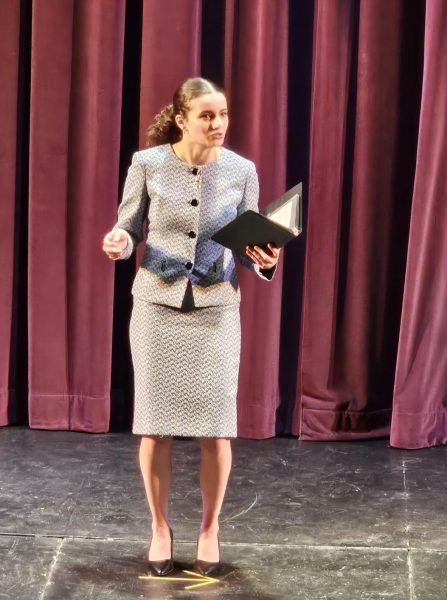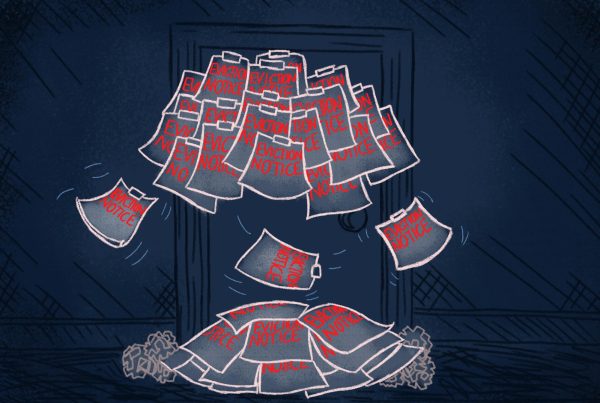Students Occupy more campuses
Speaker of the California Assembly John A. Perez D-Los Angeles, addresses reporters outside of the UC Regents meeting Nov. 28 at UC Davis (Mike Alfieri/The Inquirer)
December 7, 2011
Although students have been protesting budget cuts and tuition increases for years to no avail, the recent adoption of “Occupy” tactics may be forcing administrators to take notice.
On Monday, Dec. 5, University of California President Mark G. Yudof, announced his appointment of 12 members to lead the task force to investigate the pepper spraying incident at UC Davis. The task force will act after Knoll Consulting Firm completes its investigation of the events. The 12 members of the task force are made up of a diverse group of Davis community members, including students William McKenna and Tatiana Bush, who spoke during a Nov. 28 UC Regents meeting at UC Davis.
“My intent in forming this task force is to allow the UC Davis community to take a fair and uncompromising look at what happened on Nov. 18 … and also to make any recommendations it deems appropriate,” Yudof said.
His proposal may not satisfy all students.
“President Yudof is putting the foxes in charge of guarding the hen house,” Rachel Taylor, UC Davis student said during Regents meeting. “[the investigation panel] are privately contracted to represent and serve the regents, not the university community…We demand a truly independent investigation into these incidents.”
UC Davis is only one of the many California campuses that have joined the “Occupy” movement.
Students at San Francisco State University joined the “Occupy” movement on Dec. 1, after their President refused to listen to their pleas for a relief on fee increases. They set up tents in Malcolm X plaza and say they plan on staying there until they see change.
At UC Santa Cruz, students protested budget cuts and campus police violence by occupying the Hahn Student Services building on Nov 28.
That same day, students across the state took control over a teleconference meeting held by the Regents of the University of California. The college community voiced their opinions at UCLA, UC Davis, UCSF and UC Merced during a People’s meeting that postponed the Regents’ originally scheduled Committee on Finance agenda item.
Over 50 people were allowed one minute each to address the Regents via microphone that broadcast the speaker over a PA system and the phone that connected the teleconference to the other campuses. Students voiced their concern with educational leaders ignoring their pleas for accessible education. Many students in the UC Davis audience held signs saying “Resign Katehi.”
UC Davis Chancellor Linda Katehi has faced much scrutiny since campus police pepper-sprayed students during a peaceful protest against fee hikes. Katehi has refused to resign, but has initiated an investigation on the police response. Some students are still unsatisfied, however.
“When the Chancellors’ salary is above $400,000 and professors have to buy paper, that is a system that is not working…and when the UC Davis chancellor doesn’t know the practices of her own police force, that means she’s not doing her job,” said Puneet Kamal, UC Davis undergraduate student.
John A. Perez, speaker of the California State Assembly, who attended the meeting on the UC Davis campus, called the violence a “clearly unacceptable police response to a clearly peaceful assembly.”
Recent campus police response to peaceful protesters, like the Davis incident and the student beatings at UC Berkeley, has garnered national attention and media coverage. During a time when the world has focused its eyes on the “Occupy” movement against economic inequality, students trade in their previous rallies and sit-ins for tents.
Following the Nov 28 regents meeting, students at UC Davis held a General Assembly in Dutton Hall and unanimously passed UC Davis English Professor Nathan Brown’s move to occupy the hall for the following two weeks, through to the end of the school’s semester. The assembly agreed on the occupation.
“The proposal…is to stop administrative functions [and] establish control over the building.” Brown said.
Protesters set up tents inside of and in front of Dutton Hall to supplement the encampment that has been present at Davis for weeks prior.
While other Occupy movements have faced tough criticism by onlookers for what some see as a lack of coherent demands, student protesters hold onto to the demands that they have voiced the past few years.
“Our educational leaders must support the public education system, they should not be collaborating to privatize the system,” said Jordan Carol, UC Davis PhD student during the Regents meeting.
UC Berkeley students continue to keep an intermittent presence in front of Sproul Hall, where the beatings took place on Wednesday Nov. 9.





































































